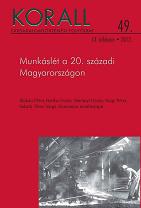„Ahol a vállalatvezetés volt az úr…” A Rimamurány–Salgótarjáni Vasmű Rt. szociális és jóléti intézményrendszere Ózdon
“Where Company Management Rules…” The Structure of Social and Welfare Institutions at Rimamurány–Salgótarján Iron Works Co., Ózd
Author(s): Péter NagySubject(s): History
Published by: KORALL Társadalomtörténeti Egyesület
Summary/Abstract: This study presents the social and cultural institutions of the Ózd iron works in the first half of the twentieth century. In this period, the Rimamurány–Salgótarján Iron Works Co. (‘Rima’), founded in 1881, was one of Hungary’s most important industrial companies. High-quality welfare and cultural institutions were created for the benefit of the employees, which made the lives of both officers and workers easier. The study is an analysis of the Ózd institutions from the turn of the century to the nationalisation of the company, because, in the author’s opinion, their services were eminent both within the company and nationwide. The opening of the iron works in a village formerly inhabited by just a few hundred people, set off a dramatic wave of development, which fundamentally transformed the life in the settlement by the 1900s. Besides the early adoption of social security, the increasing population of both blue and white collar employees were provided with newly-built residential buildings, grocery stores, indoors swimming pool, officers’ clubs, reading clubs, and schools. This suggests that the company was keen to provide a relatively high quality of life for its workers. Several charity organisations were also founded in the factory environment, which often co-operated with churches to support the poor and needy. In reality, however, life in Ózd was far less idyllic. Working conditions in the factory were poor, so employers were exposed to accidents and health risks. According to contemporary witnesses, the sum of insurance was rather low. Those living in workers’ colonies had better access to welfare services and quality entertainment for their free time than the rest of the villagers. Contemporaries, especially left-wing media, argued that the social politics of the company aimed to artificially segregate different layers of society and prevent organising advocacy. The analysis of archival documents, press and recollections makes the examination of the main theme of the study from several aspects. Naturally, the conditions in Ózd can only be sufficiently described in a larger spatial context. Thus, in this comparative analysis, local conditions are presented against the backdrop of the social politics of the ‘Rima’ and the whole country in general. The aim of the study is to draw attention to an eminent example for corporate welfare policies, while revealing the negative aspects of the system as well.
Journal: Korall - Társadalomtörténeti folyóirat
- Issue Year: 2012
- Issue No: 49
- Page Range: 17-36
- Page Count: 20
- Language: Hungarian

